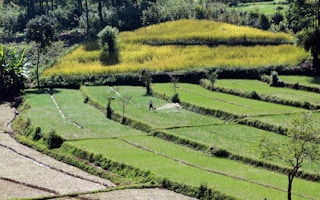The complex triangular relationship among the three pillars of life is known as the ‘water-energy-food nexus’. It’s an intricate puzzle, in which the increased demand for each limited resource can significantly affect the security of all three.
According to the International Renewable Energy Agency, global growth in population, economic development and urbanisation are expected to raise demands for water and food by 50 per cent and to double the demand for energy over the next few decades.
Water, energy and food are all fundamental to growing economies, alleviating poverty, and improving health and educational opportunities worldwide. To create a sustainable future, we must seek holistic and integrated solutions for water, energy and food challenges, as well as the appropriate balances among them.
With water being so central to food security and energy security, the potential impacts of climate change on water resources are of increasing concern. Climate change is likely to raise average temperatures in many locations, change the patterns of rainfall and inflows, and affect the frequency and severity of extreme weather events such as drought or floods – all of which increase vulnerabilities for water, food and energy resources already under strain.
A nexus approach
Our experiences throughout Australia and the Asia-Pacific region demonstrate that there is no single solution to the challenges of this nexus. Our nexus approach is a way of thinking and approaching decisions rather than a fixed solution or response.
The five broad considerations below are likely to contribute to achieving the best outcomes for water, energy and food challenges.
1. Promoting and adopting nexus thinking
Nexus thinking means considering and understanding water, food and energy and their interrelationships, rather than viewing any in isolation. It is a strategic and holistic style of thinking that considers long-term implications across the three areas, weighing up and balancing social, economic and environmental goals.
Nexus thinking looks at the big picture: considering the whole catchment or river basin rather than one river or dam in isolation, thinking about trans-boundary issues rather than a single country or area, ensuring that multiple uses (existing and future) are catered for, and bearing in mind the cumulative effects of interventions or developments rather than immediate and discrete impacts alone. It also involves thinking across agencies and organisations where responsibilities for water, food and energy lie.
2. Gathering the best information to understand nexus challenges
Responses to nexus challenges are more likely to be effective and sustainable if they are based on an informed and risk-based understanding of present conditions and possible future scenarios (taking into account interrelationships across sectors and regions).
This means that decision-makers need to understand the resource availability, current demand, known impacts, development opportunities and potential climate change implications in a given situation. They also need to understand what stakeholders and communities need, and explore opportunities for additional benefits to be realised.
3. Fostering collaboration among government, regulators, industry and communities
All stakeholders can benefit from collaborative and cooperative responses to the nexus and to stewardship of resources. The potential wins include better economic outcomes, improved reputation, reduced risks, avoided conflict, and opportunities for partnerships and cooperation among food-producing industries, the energy sector and other water-dependent industries, as well as local communities.
It’s also essential that governments, regulators and communities are closely involved in all decisions and developments affecting water, energy and food resources so that different priorities and opportunities can be considered. At a policy and regulatory level, cohesive and stable governance, policy and strategies are needed to facilitate and encourage the right collaboration that brings benefits to all stakeholders.
4. Assessing risks and building climate resilience
The interdependence of water, energy and food brings risks as well as opportunities. Interrelationships between water, energy and food, and the threats posed by climate change, should be built into risk assessments in each sector. State-of-the-art data collection, modelling and forecasting can assist businesses, governments and communities to better understand and mitigate their specific climate-related vulnerabilities and take action towards building greater resilience to future climate change impacts.
5. Innovating
In the water, energy and food sectors, technological and other innovations continue to expand the opportunities for improving productivity and resource efficiency for long-term sustainability of pressured resources. For example, an innovation such as attaching solar PV to covers on water storages can provide electricity for pumping while minimising evaporation and maximising water availability.
Nexus challenges may also bring opportunities
The nexus is not only a dynamic of ongoing resource competition. Integrated planning offers opportunities for potential synergies and benefits among sectors.
For example, in the hydropower sector, electricity generation is intrinsically linked with water availability. The need for water for irrigation to produce food and to drive agricultural productivity may compete with water requirements for hydropower generation. Hydropower’s water needs may also compete with the requirements of urban water supply, other industries and environmental and social needs.
However, renewable energy resources such as hydropower can also offer benefits to the water and food sectors through improving water resource management, providing multipurpose storages, contributing to the development of water supply infrastructure and, of course, generating the electricity critical to food-producing industries.
“
To create a sustainable future, we must seek holistic and integrated solutions for water, energy and food challenges, as well as the appropriate balances among them.
Many existing hydropower storages, both in Australia and internationally, were developed solely to supply water for energy generation. However, over time and with increasing competition for water and food, the storages have become multipurpose, often providing water for domestic supply, irrigation, and commercial and recreational fisheries.
In South-East Asia, some hydropower storages are now more important as a source of irrigation water for downstream communities than for the energy they generate. By providing water to the downstream communities, irrigation and food production has increased significantly since development of the schemes, lifting the economic development of the region and providing benefits across the community.
Integrating other renewable energies into water supply, irrigation and food production can also provide mutual benefits, such as utilising renewable energy for pumping on farms or for water desalination. Incorporating small hydropower into existing water infrastructure can improve efficiencies and create new low-carbon income streams to support effective water supply delivery.
Whether at small-scale single utility or local geographic area or at a national or multinational scale, nexus thinking can bring about mutual benefits for energy, water and food outcomes.
Dr Eleni Taylor-Wood is Entura’s Principal Consultant, Environmental and Social Science, and David Fuller is Entura’s Principal Consultant, Water Management and Technology.









